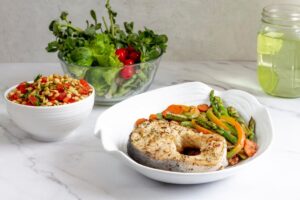The Health & Wellness Blog

Breakfast Recipes to Start Your Day Right
“Breakfast is the most important meal of the day” may seem trite, but it is a true statement. This is especially key if you aim to reduce inflammation and supercharge your health. A mindful, anti-inflammatory breakfast doesn’t just stifle morning hunger. It establishes your energy levels, mood, focus and your body’s inflammatory response for the rest of the day.
Instead of reaching for another sugary pastry or fast-feeding yourself breakfast, rethink your first meal. It’s a great chance to fuel your body with purpose. A good breakfast can help with inflammation, balance your lifestyle, or simply make you feel better.
Why Breakfast Matters for Inflammation Control
Much of the modern epidemic of ill health is powered by chronic inflammation, an insidious process that operates in the background. It can lead to joint pain, digestive problems, autoimmune disorders and fatigue. Diet is perhaps one of the best tools for addressing the source of inflammation directly. Medications and supplements have important roles, but diet is essential.
Why breakfast is important
A few factors make breakfast essential:
- Blood sugar stabilisation: A well-rounded breakfast stabilises blood sugar. That helps reduce spikes and crashes that can trigger inflammation. That surge in protein keeps cortisol controlled, so that you don’t have the 3 PM crash (and more).
- Hormonal balance: To lose weight, you do not need to load it on sugar (such as pancakes, waffles and doughnuts) — that sugar will be the last time you will have to get your energy. The stress hormone. This regulation can affect inflammation in the body.
- Gut health support: Eating fibre and fermented foods in the morning helps your microbiome. This can lower inflammation tied to digestive issues.

Key Benefits of Anti-Inflammatory Breakfasts
1. Sustained Energy Without the Crash
Whole food breakfasts with healthy fats provide lasting energy. This keeps you focused and energised throughout the afternoon.
2. Reduced Inflammatory Triggers
Avoid processed ingredients like refined sugar, trans fats, and artificial additives. This helps reduce the risk of low-grade inflammation that can build up over time.
3. Improved Mood and Focus
Anti-inflammatory foods like berries, nuts, greens, and seeds help brain health. They reduce oxidative stress, which can sharpen your focus and stabilize your mood.
4. Better Digestion
A fibre-rich breakfast helps keep your bowels healthy and lowers gut inflammation. It works even better with fermented or prebiotic ingredients.
5 Anti-Inflammatory Breakfast Recipes to Try
1. Berry Chia Pudding
Ingredients:
- 3 tbsp chia seeds
- 1 cup unsweetened almond milk
- ½ tsp cinnamon
- ½ tsp vanilla extract
- ½ cup mixed berries (blueberries, raspberries, blackberries)
Instructions: Mix chia seeds, almond milk, cinnamon, and vanilla in a jar. Stir well and refrigerate overnight. In the morning, top with berries and a few chopped walnuts.
Why it works: Chia seeds are rich in omega-3s and fibre. Berries are loaded with antioxidants, and cinnamon helps regulate blood sugar.

2. Savoury Avocado Toast with Greens
Ingredients:
- 1 slice sprouted or whole grain gluten-free bread
- ½ ripe avocado
- A handful of arugula or baby spinach
- Drizzle of olive oil
- Sprinkle of turmeric and sea salt
- Optional: poached egg
Instructions: Toast the bread, mash the avocado on top, then layer with greens. Drizzle olive oil and sprinkle turmeric for a powerful anti-inflammatory boost.
Why it works: Avocado and olive oil provide healthy fats. Leafy greens add fiber, antioxidants, and essential vitamins.
3. Golden Oats with Flax and Almonds
Ingredients:
- ½ cup rolled oats
- 1 cup unsweetened almond milk
- ¼ tsp turmeric
- 1 tbsp ground flaxseed
- 1 tbsp almond butter
- Dash of black pepper (enhances turmeric absorption)
- Optional: sliced banana or apple
Instructions: Cook oats with almond milk and turmeric. Stir in flaxseed, almond butter, and black pepper. Top with fruit if desired.
Why it works: Turmeric and flaxseed are great for fighting inflammation. Oats provide fibre, which helps keep your gut healthy.
4. Greek Yoghurt Parfait with Walnuts and Pomegranate
Ingredients:
- ½ cup plain Greek yoghurt (dairy or dairy-free alternative)
- ¼ cup pomegranate seeds
- 2 tbsp chopped walnuts
- 1 tbsp ground flax or chia seeds
- Drizzle of raw honey (optional)
Instructions: Layer ingredients in a bowl or jar. Serve chilled.
Why it works: Pomegranate and walnuts fight inflammation and support heart health. Greek yoghurt provides gut-friendly probiotics and protein.
5. Veggie-Packed Breakfast Bowl
Ingredients:
- 2 eggs (or tofu scramble)
- ½ cup cooked quinoa
- Sautéed vegetables (zucchini, mushrooms, kale, red peppers)
- 1 tbsp tahini or hummus
- Fresh herbs (parsley, cilantro)
Instructions: Scramble eggs or tofu. In a bowl, layer quinoa, veggies, and eggs. Top with tahini and herbs.
Why it works: This bowl delivers anti-inflammatory phytonutrients, plant protein, and fibre—all in one filling meal.
Common Mistakes to Avoid
Skipping Breakfast
When you skip breakfast, your body may overcompensate later with blood sugar spikes and poor food choices. Consistent, nourishing meals reduce stress on your metabolism.
Relying on Processed “Healthy” Foods
Granola bars, instant oatmeal packs, and protein shakes can seem healthy. But they often have sugar, inflammatory oils, and artificial additives. Whole food breakfasts are always better.
Ignoring Protein and Healthy Fats
Carb-heavy breakfasts can lead to energy crashes. Adding nuts, seeds, eggs, or legumes helps regulate blood sugar and provides lasting fuel.
Expert Tips to Make Breakfast Work for You
Prep Ahead
Overnight oats, chia puddings, or veggie-packed egg muffins can be prepped in batches. Convenience doesn’t have to mean compromise.

Include Color
Colourful fruits and vegetables are rich in antioxidants. Add berries to oats, greens to smoothies, or sweet potatoes to bowls for an anti-inflammatory punch.
Hydrate First
Start your day with a glass of lemon water or herbal tea before breakfast to support digestion and rehydration.
Advanced Insights from Nutrition Experts
The Cortisol Connection
Your body’s cortisol (stress hormone) levels peak in the morning. A balanced breakfast with protein, fibre, and healthy fats can reduce stress and prevent mid-morning crashes.
Gut Microbiome and Breakfast
Your first meal influences your microbiome for the day. Adding fermented foods or fibre-rich ingredients to breakfast, like kefir, chia, or oats, helps healthy bacteria grow. This can lower systemic inflammation.
Personalisation Matters
Not every anti-inflammatory food works for everyone. Some may react poorly to certain fruits, grains, or dairy. Keep a simple food journal to track how breakfast choices affect your mood, digestion, and energy.
Start Strong, Stay Balanced
Choosing the right breakfast isn’t just a trend. It’s about listening to your body. Avoid inflammatory triggers and fuel yourself with purpose. A balanced breakfast with fibre, protein, healthy fats, and antioxidants can boost your health. It helps with long-term vitality and keeps inflammation in check.
Start tomorrow with a purpose. Whether you try chia pudding, golden oats, or a veggie-packed bowl, each bite is a step toward better health—one breakfast at a time.









